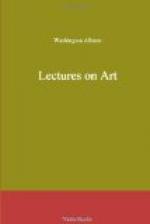That such an effect should follow a cause which we know to be purely imaginary, supposes, as we have said, something in ourselves which holds, of necessity, a predetermined relation to every object either outwardly existing or projected from the mind, which we thus recognize as true. If so, then the Possible and the Ideal are convertible terms; having their existence, ab initio, in the nature of the mind. The soundness of this inference is also supported negatively, as just observed, by the opposite result, as in the case of those fantastic combinations, which we sometimes meet with both in Poetry and Painting, and which we do not hesitate to pronounce unnatural, that is, false.
And here we would not be understood as implying the preexistence of all possible forms, as so many patterns, but only of that constructive Power which imparts its own Truth to the unseen real, and, under certain conditions, reflects the image or semblance of its truth on all things imagined; and which must be assumed in order to account for the phenomena presented in the frequent coincident effect between the real and the feigned. Nor does the absence of consciousness in particular individuals, as to this Power in themselves, fairly affect its universality, at least potentially: since by the same rule there would be equal ground for denying the existence of any faculty of the mind which is of slow or gradual developement; all that we may reasonably infer in such cases is, that the whole mind is not yet revealed to itself. In some of the greatest artists, the inventive powers have been of late developement; as in Claude, and the sculptor Falconet. And can any one believe that, while the latter was hewing his master’s marble, and the former making pastry, either of them was conscious of the sublime Ideas which afterwards took form for the admiration of the world? When Raffaelle, then a youth, was selected to execute the noble works which now live on the walls of the Vatican, “he had done little or nothing,” says Reynolds, “to justify so high a trust.” Nor could he have been certain, from what he knew of himself, that he was equal to the task. He could only hope to succeed; and his hope was no doubt founded on his experience of the progressive developement of his mind in former efforts; rationally concluding, that the originally seeming blank from which had arisen so many admirable forms was still teeming with others, that only wanted the occasion, or excitement, to come forth at his bidding.
To return to that which, as the interpreting medium of his thoughts and conceptions, connects the artist with his fellow-men, we remark, that only on the ground of some self-realizing power, like what we have termed Poetic Truth, could what we call the Ideal ever be intelligible.




